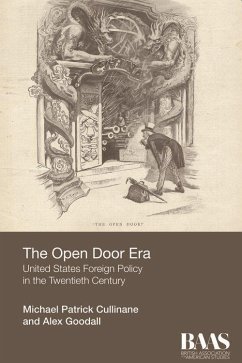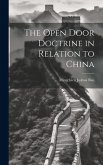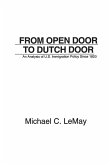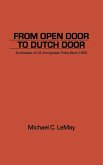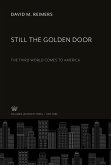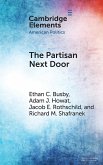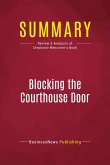'In this engaging book, Michael Cullinane and Alex Goodall forensically dissect and analyse one of the great shibboleths of US foreign relations. Though the Open Door arose from enlightened ideas of international engagement, the authors demonstrate both its limits when it came to policy implementation and how it became a contested symbol for critics at home and beyond.' Jay Sexton, Kinder Institute Chair, University of Missouri Examines the Open Door, the most influential US foreign policy of the twentieth century In 1899, US Secretary of State John Hay wrote six world powers calling for an 'Open Door' in China that would guarantee equal trading opportunities, curtail colonial annexation and prevent conflict in the Far East. Within a year, the region had succumbed to renewed colonisation and war, but despite the apparent failure of Hay's diplomacy, the ideal of the Open Door emerged as the central component of US foreign policy in the twentieth century. Just as visions of 'Manifest Destiny' shaped continental expansion in the nineteenth century, Woodrow Wilson used the Open Door to make the case for a world 'safe for democracy', Franklin Roosevelt developed it to inspire the fight against totalitarianism and imperialism, and Cold War containment policy envisioned international communism as the latest threat to a global system built upon peace, openness and exchange. In a concise yet wide-ranging examination of its origins and development, readers will discover how the idea of the Open Door came to define the American Century. Key Features - Uncovers the ideological wellspring of US foreign policy in the twentieth century - Presents debates over US foreign policy, including the 'Wisconsin School' critique of the Open Door as a mechanism of informal empire - Reveals both the consistency of US foreign policy thinking and offers a deeper context to critical foreign policy decisions - Contextualises the roots of contemporary US policy Michael Cullinane is Reader in US History and Director of Distance Learning at Northumbria University. Alex Goodall is Senior Lecturer in International History at University College London. Cover image: The Open Door. Harper's Weekly cover, 5th August 1899. Cover design: [EUP logo] edinburghuniversitypress.com ISBN [cover] 978-1-4744-0131-9 [PPC] 978-1-4744-0131-9 Barcode
Hinweis: Dieser Artikel kann nur an eine deutsche Lieferadresse ausgeliefert werden.
Hinweis: Dieser Artikel kann nur an eine deutsche Lieferadresse ausgeliefert werden.

